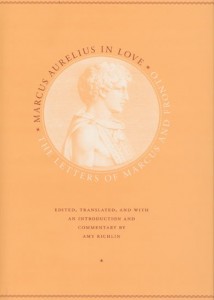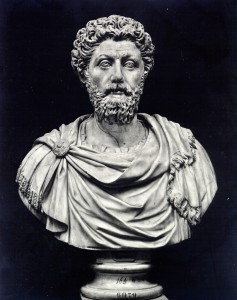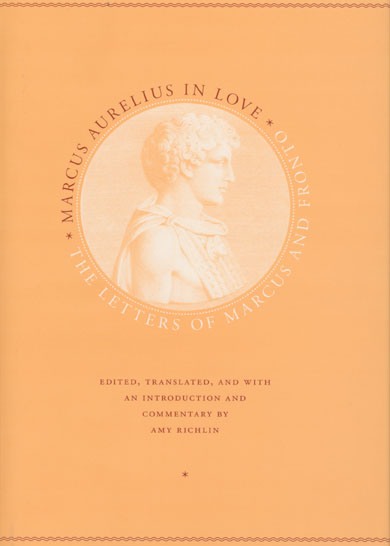 Marcus Aurelius in Love: The Letters of Marcus and Fronto
Marcus Aurelius in Love: The Letters of Marcus and Fronto
Edited and translated by Amy Richlin
University of Chicago Press
168 pages, $35.
IMAGINE WRITING a letter to your most brilliant teacher. Then imagine writing to your emperor, a man with the power of life and death over his subjects. These intimidating circumstances form the background for the correspondence between Marcus Aurelius Antoninus, Roman Emperor from 161 to 180, and Marcus Cornelius Fronto, a prominent orator who was hired to instruct the young Caesar-in-training in rhetoric. The most intriguing aspect to the letters presented in Amy Richlin’s beautifully edited volume is the question she asks early in her introduction: were Marcus and Fronto in love?
The existence of these letters was unknown until 1815, when they were discovered underneath a text written on recycled parchment. A completely accurate reconstruction of the original was impossible due to gaps and illegible words, but classical scholars produced several editions, the most recent published in 1988. An English translation appeared in 1824, but it was not until 1919–20 that a “word for word” translation of all the letters was published.
If you’ve read the Meditations—the book of Stoic philosophy that’s the best-known of Marcus Aurelius’ works—but have never heard of these letters, don’t worry. Victorian readers found Fronto’s letters dull and poorly written. Nor were they interested in the possibility that the revered Stoic philosopher-emperor Marcus Aurelius had a sexual relationship with another man. There were complaints about the quality of the Latin editions and the cumbersome format of the English translation. In short, Fronto’s letters do not appear on many classical literature reading lists. Amy Richlin, a professor at UCLA, does two things to change that.
She has made a selection of the letters of Fronto and Marcus written between 139 and 148 that suggests, in her view, that the two men were lovers. More importantly, she updates the standard Victorian translation to a style that is “readable now.” This means she includes double entendres the reader will get, current slang, and contractions. She turns snippets of Greek into snippets of French and substitutes quotations from Shakespeare for those of early Latin authors. The second strategy is certainly a success: the letters are wonderfully readable. The first strategy, even Richlin admits, will not convince every reader.
The power differential between Marcus and Fronto—student and teacher, emperor and subject—causes each man to show off for the other. Marcus is the more engaging performer, probably because he is only eighteen when the correspondence begins and is less guarded than Fronto, a mature man and master rhetorician who must instruct his prize pupil by example. Knowing that Cicero, another great orator, was executed a hundred years earlier, Fronto must also watch what he says. Both men are effusive in their declarations of affection, but it is hard to tell if this is anything more than the manner in which well-educated Romans expressed devotion and friendship in the 2nd century.
The letters from Marcus definitely include sexual innuendos, as in this passage: “And perhaps  for a tiny few days still I won’t see you, while you firm yourself up, as you must. So, while you’re ly-ing there, my soul will be flat on its back, too; and when, with the gods’ help, you stand upright, my soul will stand as well, which is now parched with the most burning longing for you.” This is undeniably erotic, and it’s as close as the book comes to suggesting a physical relationship between the two men. But it is also a verbal performance meant to impress a teacher. To my mind, Marcus is more appealing when he simply describes his daily life: an amusing encounter with shepherds who don’t know who he is; his remedy for a cold; a lesson in stomping grapes. Writers’ letters have always provided an unguarded glimpse into how distant people lived and what they felt. Marcus offers this glimpse a number of times in his letters. Fronto, on the other hand, lets down his guard only as the correspondence nears its end.
for a tiny few days still I won’t see you, while you firm yourself up, as you must. So, while you’re ly-ing there, my soul will be flat on its back, too; and when, with the gods’ help, you stand upright, my soul will stand as well, which is now parched with the most burning longing for you.” This is undeniably erotic, and it’s as close as the book comes to suggesting a physical relationship between the two men. But it is also a verbal performance meant to impress a teacher. To my mind, Marcus is more appealing when he simply describes his daily life: an amusing encounter with shepherds who don’t know who he is; his remedy for a cold; a lesson in stomping grapes. Writers’ letters have always provided an unguarded glimpse into how distant people lived and what they felt. Marcus offers this glimpse a number of times in his letters. Fronto, on the other hand, lets down his guard only as the correspondence nears its end.
In the classical world, rhetoric was the art of persuasion. Fronto was a master of this art, as he demonstrates repeatedly in his letters. He can adopt poses, imitate early Latin authors, and pile on literary conceits. His style can be windy and he often sounds insincere. In the end, even if Marcus and Fronto were lovers, life took them in different directions. In his last letter in the book, Marcus tells his teacher that he can no longer argue both sides of an issue as though either were true. He has discovered philosophy, the search for truth, which is different from the art of swaying opinion. Fronto will be replaced by a new teacher. The final four letters come from Fronto. They are subdued, almost plaintive in their deference, and formal in their expressions of feeling—in other words, the letters of a jilted lover.
This is a beautifully printed book, a pleasure just to hold. The introduction, commentary, and notes—clear, informative, often amusing—are a delight to read. What this book demonstrates is that Marcus and Fronto definitely had a love affair of the mind, whether or not they were lovers of the other variety.
Daniel Burr is an assistant dean at the Univ. of Cincinnati College of Medicine, where he teaches courses on literature and medicine.





